Taking the 'killer' out of natural killer cells

The virus responsible for chickenpox and shingles employs a powerful strategy of immune evasion, inhibiting the ability of natural killer cells to destroy infected cells and produce molecules that help control viral infection, according to a study published June 13 in the open-access journal PLOS Pathogens by Allison Abendroth of the Discipline of Infectious Diseases and Immunology in the Charles Perkins Centre at the University of Sydney, and colleagues. As the authors noted, future studies that elucidate the underlying molecular mechanisms may allow exploitation of this knowledge in therapeutic settings in which aberrant natural killer cell activation can cause immunopathology, such as in certain autoimmune diseases, graft-versus-host-disease, and transplant rejection.
Natural killer cells are white blood cells that help control viral infection by killing infected cells and secreting molecules called pro-inflammatory cytokines to activate and direct the immune response. In retaliation, viruses such as varicella zoster virus (VZV), which causes chickenpox and shingles, dampen the immune system to establish infection in humans. VZV can infect human natural killer cells, but it was not known how, or if, VZV could directly affect natural killer cell function. To address this gap in knowledge, Abendroth and her colleagues cultured human peripheral blood mononuclear cells with VZV-infected cells, and then assessed the functional capacity of natural killer cells.
The researchers identified a previously unreported strategy employed by VZV to powerfully inhibit natural killer cell function, hindering the ability of natural killer cells to destroy infected cells and produce cytokines. This powerful impairment of function is dependent on direct contact between natural killer cells and VZV-infected cells. In this way, VZV paralyses natural killer cells from functionally responding to target cells. The closely related virus, herpes simplex virus type 1, is also capable of efficiently infecting natural killer cells and rendering natural killer cells unresponsive to target cell stimulation. According to the authors, these findings indicate for the first time that two human alphaherpesviruses directly target multiple anti-viral functions of natural killer cells for immune evasion.
The authors add, "We now have a clearer understanding as to how herpesviruses are able to manipulate the host immune response."
More information: Campbell TM, McSharry BP, Steain M, Russell TA, Tscharke DC, Kennedy JJ, et al. (2019) Functional paralysis of human natural killer cells by alphaherpesviruses. PLOS Pathogens 15(6): e1007784. doi.org/10.1371/journal.ppat.1007784


















